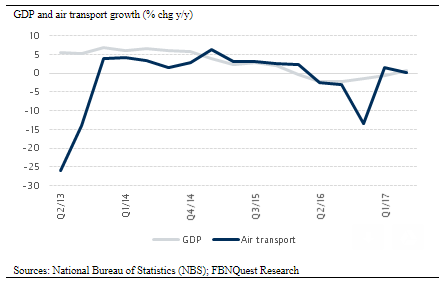The Nigeria aviation industry, which suffered from relatively low patronage due largely to softer demand in the wake of the recession the country entered into, is picking up gradually, according to research analysts at FBNQuest.
In a Good Morning Note, “Wheels up but still waiting for take-off”, Friday, the analysts affirm that following the recent exit from recession in Q2, air transport grew by just 0.1% percent year-on-year.
In the height of the recession, personal travels fell drastically as average purchasing power drop abysmally vis-a-vis rising cost of tickets. However, business travel continued to drive air passenger traffic across the country.
“For domestic travelers, ticket fares doubled earlier in the year and have remained high. Passengers could then secure a return trip ticket for $85 on the Lagos-Abuja route,” they pointed out, adding that the cost has now risen as high as $175 on the current domestic providers (Arik Air and Air Peace).
“We expect even higher prices over the next month as we approach the festive season,” they noted.
The analysts adduced high operational costs as cause of the increased ticket fares, saying that aviation fuel accounts for about 40 percent of operational costs.
“Industry sources indicate that the price of aviation fuel currently stands at N265/l,” they added.
For international travel, they noted that forex sourcing issues had a severe negative effect on airline operators, as they could not repatriate funds.
“Nigeria became less attractive for operators and a few airlines reduced the frequency of their flights. However, the CBN has managed to reduce the blocked funds to $175 million from the initial $600 million according to IATA,” they said.
They said Nigeria’s aviation industry has the potential to become a pan-African hub similar to Kenya, which the infrastructural deficit within the industry will not permit.
As at now the three major international airports in the country are undergoing renovation and expansion.








